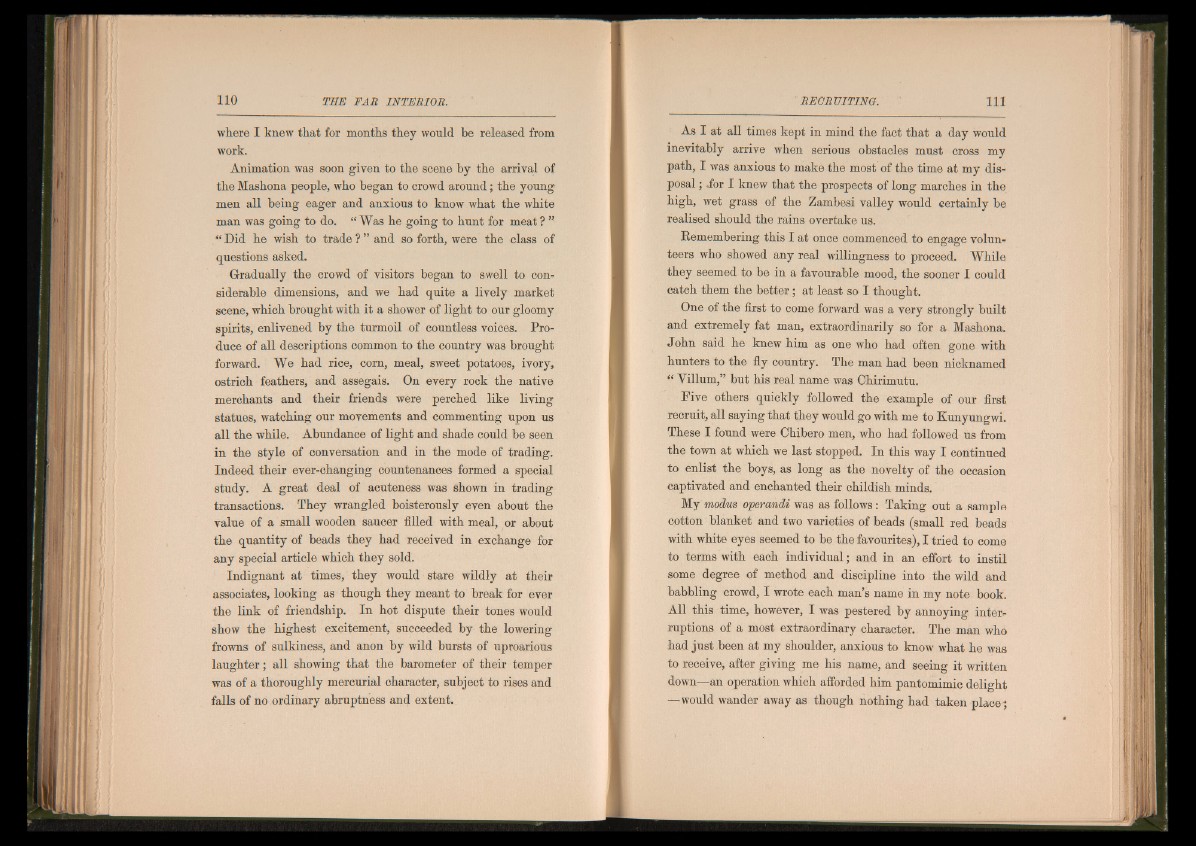
where I knew that for months they would be released from
work.
Animation was soon given to the scene by the arrival of
the Mashona people, who began to crowd around ; the young
men all being eager and anxious to know what the white
man was going to do. “Was he going to hunt for meat? ”
/ ‘Did he wish to trad e ? ” and so forth, were the class of
questions asked.
Gradually the crowd of visitors began to swell to considerable
dimensions, and we had quite a lively market
scene, which brought with it a shower of light to our gloomy
spirits, enlivened by the turmoil of countless voices. Produce
of all descriptions common to the country was brought
forward. We had rice, corn, meal, sweet potatoes, ivory,
ostrich feathers, and assegais. On every rock the native
merchants and their friends were perched like living
statues, watching our movements and commenting upon us
all the while. Abundance of light and shade could be seen
in the style of conversation and in the mode of trading.
Indeed their ever-changing countenances formed a special
study. A great deal of acuteness was shown in trading
transactions. They wrangled boisterously even about the
value of a small wooden saucer filled with meal, or about
the quantity of beads they had received in exchange for
any special article which they sold.
Indignant at times, they would stare wildly at their
associates, looking as though they meant to break for ever
the link of friendship. In hot dispute their tones would
show the highest excitement, succeeded by the lowering
frowns of sulkiness, and anon by wild bursts of uproarious
laughter ; all showing that the barometer of their temper
was of a thoroughly mercurial character, subject to rises and
falls of no ordinary abruptness and extent.
As I at all times kept in mind the fact that a day would
inevitably arrive when serious obstacles must cross my
path, I was anxious to make the most of the time at my disposal
; dor I knew that the prospects of long marches in the
high, wet grass of the Zambesi valley would certainly be
realised should the rains overtake us.
Remembering this I at once commenced to engage volunteers
who showed any real willingness to proceed. While
they seemed to be in a favourable mood, the sooner I could
catch them the better; at least so I thought.
One of the first to come forward was a very strongly built
and extremely fat man, extraordinarily so for a Mashona.
John said he knew him as one who had often gone with
hunters to the fly country. The man had been nicknamed
“ Yillum,” but his real name was Chirimutu.
Pive others quickly followed the example of our first
recruit, all saying that they would go with me to Kunyungwi.
These I found were Chibero men, who had followed us from
the town at which we last stopped. In this way I continued
to enlist the boys, as long as the novelty of the occasion
captivated and enchanted their childish minds
My modus operandi was as follows: Taking out a sample
cotton blanket and two varieties of beads (small red beads
with white eyes seemed to be the favourites), I tried to come
to terms with each individual; and in an effort to instil
some degree of method and discipline into the wild and
babbling crowd, I wrote each man’s name in my note book.
All this time, however, I was pestered by annoying interruptions
of a most extraordinary character. The man who
had just been at my shoulder, anxious to know what he was
to receive, after giving me his name, and seeing it written
down—an operation which afforded him pantomimic delight
—would wander away as though nothing had taken placet